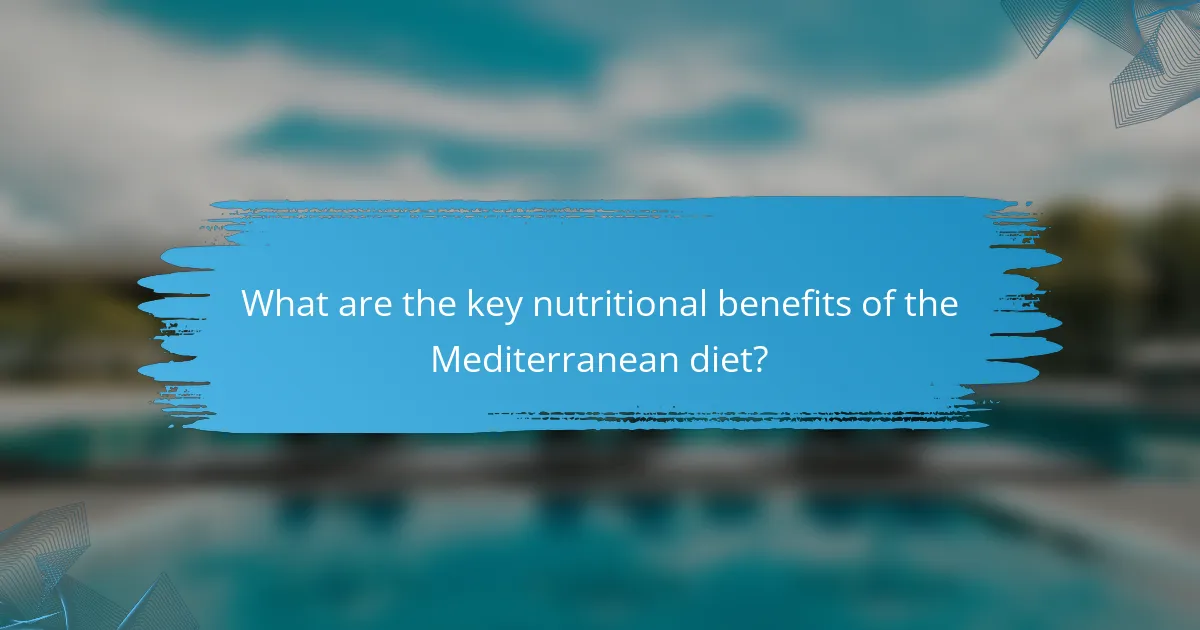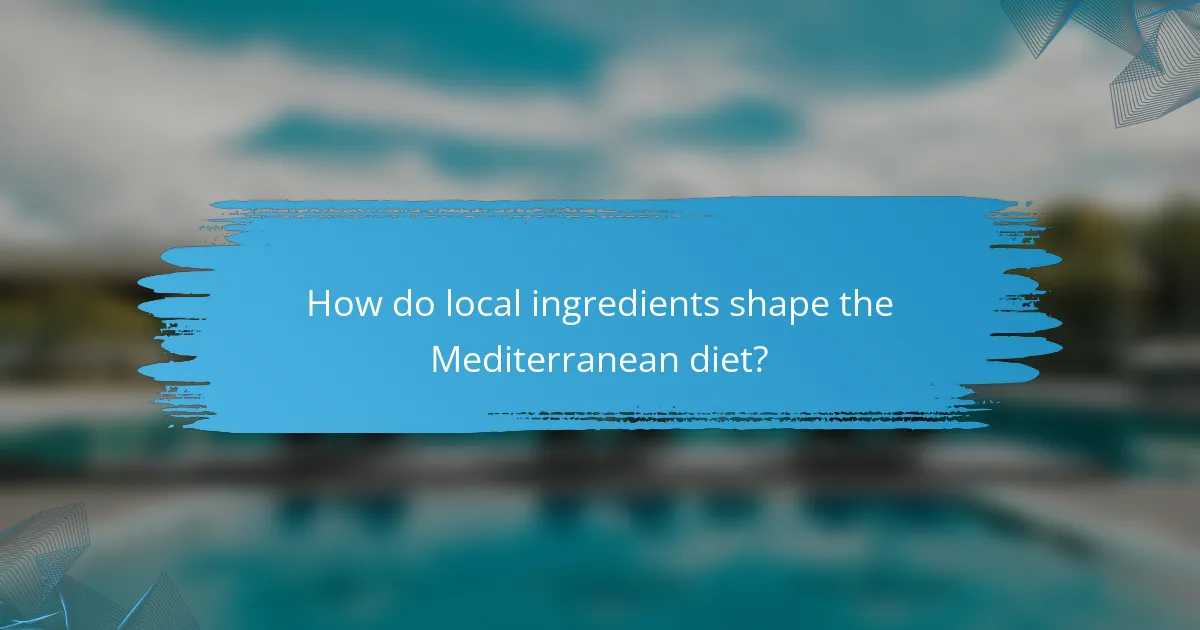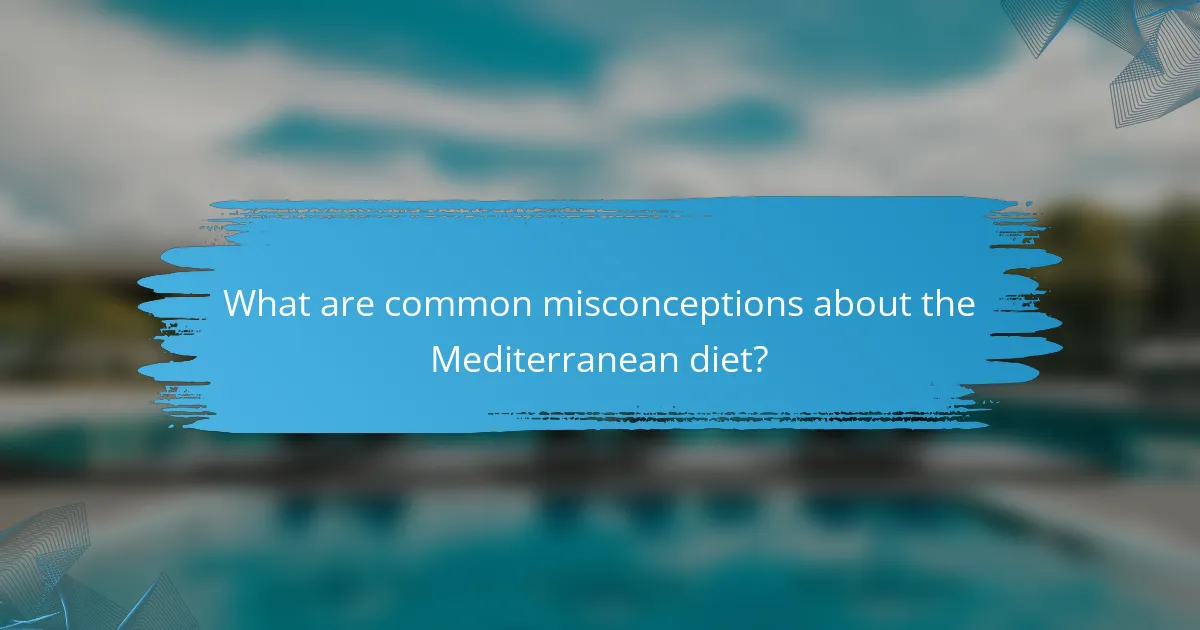The Mediterranean diet is renowned for its nutritional benefits, including heart health and weight management. This article explores its key nutritional value, highlights local ingredients that enhance flavor and health, and discusses eco-friendly practices that promote sustainability. Discover the unique dishes that exemplify this diet and debunk common misconceptions to help you adopt this beneficial eating pattern effectively.

What are the key nutritional benefits of the Mediterranean diet?
The Mediterranean diet offers numerous nutritional benefits, including improved heart health, weight management, and enhanced cognitive function. Rich in fruits, vegetables, whole grains, and healthy fats, this diet promotes longevity and reduces the risk of chronic diseases.
Key nutritional benefits include:
– High in antioxidants from fresh produce.
– Healthy fats from olive oil and nuts support cardiovascular health.
– Fiber from whole grains aids digestion and weight control.
– Omega-3 fatty acids from fish boost brain health.
– Low in processed foods, reducing inflammation.
These attributes contribute to the Mediterranean diet’s reputation as a sustainable and health-promoting eating pattern.
How does the Mediterranean diet support heart health?
The Mediterranean diet significantly supports heart health by emphasizing whole foods, healthy fats, and plant-based ingredients. This diet is rich in fruits, vegetables, whole grains, and olive oil, which contribute to lower cholesterol levels and reduced inflammation. Studies show that adherence to the Mediterranean diet can decrease the risk of heart disease by up to 30%. The inclusion of omega-3 fatty acids from fish further enhances cardiovascular health. Additionally, the diet’s focus on moderate wine consumption and physical activity promotes overall well-being.
Which vitamins and minerals are abundant in Mediterranean foods?
Mediterranean foods are rich in vitamins and minerals, particularly vitamin C, vitamin E, potassium, magnesium, and calcium. These nutrients contribute to overall health and wellness. For example, fruits like oranges provide vitamin C, while nuts and seeds are excellent sources of vitamin E. Leafy greens and legumes contribute potassium and magnesium, supporting heart health and muscle function. Olive oil, a staple in this diet, enhances the absorption of these nutrients.
What role do healthy fats play in the Mediterranean diet?
Healthy fats are essential in the Mediterranean diet, providing numerous health benefits. They support heart health, reduce inflammation, and enhance nutrient absorption. Common sources include olive oil, nuts, and avocados, which are rich in monounsaturated and polyunsaturated fats. These fats contribute to overall well-being and longevity, aligning with the diet’s emphasis on whole, natural foods.

How do local ingredients shape the Mediterranean diet?
Local ingredients significantly enhance the Mediterranean diet by providing fresh, seasonal, and nutrient-rich options. These ingredients, such as olive oil, tomatoes, and legumes, contribute to the diet’s overall health benefits. The use of local produce ensures that meals are flavorful while supporting sustainable agricultural practices. For instance, the high antioxidant content of locally sourced fruits and vegetables promotes heart health. Moreover, incorporating regional herbs and spices adds unique flavors that differentiate Mediterranean cuisine from other diets. This emphasis on local sourcing fosters a connection between the community and its food, promoting eco-friendly practices and reducing carbon footprints.
What are the staple foods in Mediterranean cuisine?
Staple foods in Mediterranean cuisine include vegetables, fruits, whole grains, legumes, seafood, and olive oil. These ingredients provide essential nutrients and promote a balanced diet.
Key vegetables are tomatoes, peppers, and eggplants, while fruits like citrus and grapes are prevalent. Whole grains include bread and pasta, often made from durum wheat. Legumes such as chickpeas and lentils are common protein sources. Seafood, particularly fish, is favored due to its omega-3 fatty acids. Olive oil serves as the primary fat, known for its heart-healthy benefits.
The Mediterranean diet emphasizes fresh, local ingredients and eco-friendly practices, supporting sustainable agriculture and biodiversity in food systems.
Which regional variations influence ingredient choices?
Regional variations significantly influence ingredient choices in the Mediterranean diet. Local climates and traditions dictate the availability of fresh produce, herbs, and seafood, shaping dietary preferences. For instance, coastal regions emphasize fish and seafood, while inland areas focus on grains and legumes. Seasonal ingredients are prioritized, enhancing nutritional value and sustainability. Additionally, cultural practices and historical influences contribute to unique regional dishes, utilizing local olive oils and cheeses. This diversity reflects both the ecological practices and nutritional benefits inherent in the Mediterranean diet.
How do seasonal ingredients enhance meal variety?
Seasonal ingredients significantly enhance meal variety in the Mediterranean diet by introducing fresh flavors and nutrients. Utilizing local produce fosters creativity in cooking, allowing for diverse dishes throughout the year. Seasonal fruits and vegetables provide peak nutritional value, supporting health benefits. For example, tomatoes in summer offer antioxidants, while winter greens boost vitamins. This practice also promotes eco-friendly habits by reducing carbon footprints associated with transportation. Emphasizing seasonal eating aligns with the diet’s core principles of sustainability and local sourcing.

What eco-friendly practices are associated with the Mediterranean diet?
The Mediterranean diet promotes various eco-friendly practices that enhance sustainability. These practices include prioritizing local and seasonal ingredients, which reduces transportation emissions. Additionally, the diet emphasizes plant-based foods, lowering the carbon footprint associated with meat production. Sustainable fishing methods are also integral, ensuring marine life conservation. Community-supported agriculture fosters local economies and encourages biodiversity. Furthermore, minimal processing of foods helps reduce waste and energy consumption.
How does the Mediterranean diet promote sustainable agriculture?
The Mediterranean diet promotes sustainable agriculture by emphasizing local ingredients and eco-friendly practices. This dietary approach encourages the use of seasonal produce, reducing the carbon footprint associated with transportation.
Additionally, it supports biodiversity by prioritizing traditional farming methods, which often include crop rotation and organic practices. These methods enhance soil health and reduce reliance on synthetic fertilizers and pesticides.
By fostering community-supported agriculture, the Mediterranean diet strengthens local economies and encourages the consumption of fresh, nutrient-dense foods. This connection between diet and sustainable farming practices highlights the diet’s role in promoting environmental stewardship.
What are the environmental impacts of Mediterranean food sourcing?
The environmental impacts of Mediterranean food sourcing are generally positive, promoting sustainability. Local sourcing reduces carbon footprints by minimizing transportation. Seasonal ingredients support biodiversity and soil health. Traditional farming practices enhance ecosystem resilience. Overall, these practices contribute to a healthier planet.
How can individuals adopt eco-friendly practices in meal preparation?
Individuals can adopt eco-friendly practices in meal preparation by focusing on local ingredients, minimizing food waste, and using sustainable cooking methods.
Choosing seasonal produce reduces carbon footprints associated with transportation. Meal planning helps avoid over-purchasing, which leads to waste. Using energy-efficient appliances and methods, such as steaming or slow cooking, conserves energy. Composting organic waste enriches soil and reduces landfill contributions.
Incorporating plant-based meals further lowers environmental impact. Engaging in community-supported agriculture (CSA) connects individuals with local farmers, promoting sustainable practices. By embracing these strategies, individuals can significantly contribute to a healthier planet.

Which unique dishes exemplify the Mediterranean diet?
Unique dishes that exemplify the Mediterranean diet include Greek moussaka, Italian caponata, Spanish paella, and Moroccan tagine. These dishes showcase local ingredients, such as vegetables, legumes, and healthy fats, while emphasizing eco-friendly practices. Each dish reflects the cultural richness and nutritional benefits of the Mediterranean region.
What are some traditional recipes from different Mediterranean regions?
Mediterranean cuisine features diverse traditional recipes that reflect local ingredients and cultural practices. Popular dishes include Greek moussaka, Italian risotto, Spanish paella, and Moroccan tagine. Each recipe showcases unique attributes, such as moussaka’s layered eggplant and meat or paella’s saffron-infused rice. These dishes often emphasize seasonal vegetables, whole grains, and healthy fats, aligning with eco-friendly practices of the Mediterranean diet.
How do modern interpretations of Mediterranean dishes differ from traditional ones?
Modern interpretations of Mediterranean dishes often prioritize health and sustainability over traditional methods. Chefs incorporate local, organic ingredients and adapt recipes to reflect contemporary dietary preferences. For example, traditional olive oil might be replaced with avocado oil for a different fat profile. Additionally, plant-based versions of classic dishes are increasingly popular, aligning with the rising demand for vegetarian and vegan options. This shift emphasizes the Mediterranean diet’s core principles while catering to modern tastes.

What are common misconceptions about the Mediterranean diet?
Many misconceptions about the Mediterranean diet include the belief that it is solely based on pasta and olive oil. In reality, it emphasizes a diverse range of local ingredients, including fruits, vegetables, whole grains, and lean proteins. Another common myth is that it is not suitable for weight loss; however, research shows that it can promote healthy weight management when combined with portion control. Additionally, some people think it lacks variety, but the diet’s flexibility allows for numerous culinary adaptations across different cultures. Lastly, the idea that it is overly expensive is misleading, as many staples are affordable and seasonal.
Why do some believe the Mediterranean diet is too restrictive?
Some believe the Mediterranean diet is too restrictive because it emphasizes whole foods and limits processed options. The diet focuses on fruits, vegetables, whole grains, and healthy fats, which some perceive as a lack of variety. Additionally, it often discourages red meat and sugary foods, leading to the impression of restriction. However, the Mediterranean diet promotes flexibility by allowing diverse local ingredients and creative meal preparation. This adaptability can enhance enjoyment and sustainability, countering the notion of strictness.
How does the Mediterranean diet compare to other dietary approaches?
The Mediterranean diet emphasizes whole foods, healthy fats, and plant-based ingredients, distinguishing it from other diets. It promotes heart health through olive oil, vegetables, and legumes, while other approaches may focus on different macronutrient ratios or processed foods.
Compared to low-carb diets, the Mediterranean diet includes a wider variety of food groups, fostering a balanced intake of nutrients. Its emphasis on local ingredients supports sustainability, unlike some diets that rely on imported or heavily processed items.
Research indicates that adherence to the Mediterranean diet can lead to a lower risk of chronic diseases, showcasing its long-term health benefits over more restrictive diets. This diet’s unique attribute is its cultural heritage, which enhances the enjoyment of meals and social connections.

What practical tips can help individuals successfully adopt the Mediterranean diet?
To successfully adopt the Mediterranean diet, focus on incorporating whole foods, seasonal ingredients, and sustainable practices. Start by prioritizing fruits, vegetables, whole grains, and healthy fats like olive oil.
1. Plan meals around plant-based foods.
2. Choose local and seasonal ingredients for freshness.
3. Limit processed foods and added sugars.
4. Emphasize fish and lean proteins over red meat.
5. Practice mindful eating and portion control.
6. Engage in regular physical activity to complement dietary changes.
These practical tips will help maintain a balanced approach while enjoying the diet’s health benefits.
What are the best strategies for meal planning within the Mediterranean framework?
The best strategies for meal planning within the Mediterranean framework include focusing on seasonal local ingredients, emphasizing plant-based foods, and incorporating healthy fats. Prioritize whole grains, legumes, fruits, and vegetables while minimizing processed foods.
1. Choose seasonal produce to enhance flavor and nutritional value.
2. Plan meals around legumes, nuts, and whole grains for protein and fiber.
3. Incorporate healthy fats like olive oil and fatty fish for heart health.
4. Use herbs and spices for flavor instead of salt.
5. Prepare meals in batches to save time and reduce waste.
6. Aim for variety to ensure a wide range of nutrients.
How can one incorporate Mediterranean principles into a busy lifestyle?
Incorporating Mediterranean principles into a busy lifestyle involves prioritizing fresh, local ingredients and simple meal preparation. Focus on whole foods like fruits, vegetables, whole grains, and healthy fats such as olive oil. Meal prepping on weekends can help maintain this diet during hectic weekdays.
Consider quick recipes that highlight seasonal ingredients. For example, a salad with mixed greens, cherry tomatoes, feta cheese, and a drizzle of olive oil can be prepared in minutes. Batch cooking grains like quinoa or brown rice can provide a nutritious base for various meals throughout the week.
Engage in mindful eating by savoring meals and reducing distractions during meal times. This practice not only enhances the dining experience but also promotes better digestion. Lastly, incorporate physical activity into your routine, such as walking or biking, to align with the Mediterranean lifestyle’s emphasis on health and well-being.
What common mistakes should be avoided when transitioning to the Mediterranean diet?
To successfully transition to the Mediterranean diet, avoid these common mistakes. First, don’t underestimate the importance of local ingredients; they enhance freshness and flavor. Second, be cautious about portion sizes; even healthy foods can lead to weight gain if consumed excessively. Third, neglecting meal planning can result in reliance on processed foods. Lastly, avoid skipping physical activity, as it is integral to the Mediterranean lifestyle and overall health.